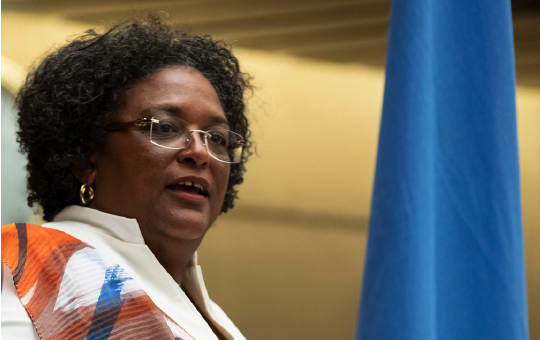Prime Minister Mia Mottley has thrown out a challenge to actuaries in Barbados and the rest of the region to take the lead on discussions relating to several issues, including shrinking population and the impact on national insurance schemes.
This comes as Barbados and the rest of the Caribbean struggle with high unemployment numbers, resulting in the collective payout of millions of dollars in unemployment benefits.
Mottley, who was addressing a roundtable session of the Caribbean Actuarial Association (CAA) recently, insisted that the time had come for the region to show that despite its small size it could still be a leader in several areas.
The CAA online forum was held under the theme Achieving a Greener, Smarter, Fairer, Recovery and Resilience – Moving From Talk to Action, and formed part of the association’s week-long 30th anniversary celebrations.
“In short, I need you on our team to help Caribbean growth and to become a better region that can provide for its people and you are well positioned to be able to make that step for us,” Mottley told the online audience.
In relation to concerns about dwindling population size in the region, Mottley said she believed actuaries should start leading the discussion about the potential impact this could have on national insurance schemes.
“Your association can play a vital role in all of this,” she said, adding that the “best policies come from good data. I need you to help develop new instruments and new mechanisms to address our risks and opportunities better.”
She said despite there being a fully funded national insurance scheme in place in Barbados, there was a need for experts to “raise their voices on all of the implications of demographic changes”.
“We are facing it and living it live and direct. We have discovered that Barbados has not replaced its population since 1980 and that our labour force in 15 years, in 2035, will be smaller than it is now if we do nothing now to change the direction in which it is going,” she said.
Mottley also spoke of the need for new funding models to help the region build more resilient communities and cities, pointing out that it could require upwards of $20 billion to achieve such a goal.
She said despite the vulnerabilities associated with the climate crisis, there were also opportunities to become climate resilient and an example for the rest of the world to follow. She pointed out that Barbados was already taking steps to cushion future potential fallout from natural disasters, but said the efforts so far were just “a drop in the ocean”.
“We can shine a torch for others to follow, I truly believe that. And indeed sometimes we have,” said Mottley. “Today, Barbados is the world’s largest issuer of bonds with natural disaster clauses. I am sorry that we didn’t have in the pandemic clause, but we will learn for the future,” she said.
Pointing to Barbados’ efforts to keep COVID-19 from infecting the population, Mottley said, “We can set an example of how safe people can do safe things, in safe ways in a safe country. Our COVID-19 safety and stability are indeed becoming a beacon,” she noted.
She also highlighted the Barbados 12-Month Welcome Stamp as an example of a small state “leading the reinvention of the visitor economy for a safer world”.
However, in the area of health, Mottley said the time had come for Barbados and other regional states to take the lead in “taking new nationwide population health approaches to reverse the high incidences of diabetes”.
Mottley also called for discussions on the development of a new digital payment system in the region so as to address issues relating to derisking. “Now is the time we need to rise to the challenge and now is the time for you to shine that torch,” said Mottley.




